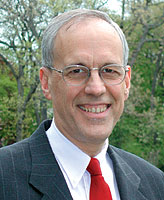| |
 |
| |
©Thom
Duncan
Roger "Whit" Shepard |
| |
|
New
Kellogg School associate dean delivering 'the lift of a driving
dream'
By
Matt Golosinski
In May,
the Kellogg School named Roger "Whit" Shepard associate dean
for development and alumni relations.
Bringing
nearly two decades of leadership experience in fund raising
to the Kellogg School, Dean Shepard is now responsible for
all Kellogg fund-raising activities and for engaging and strengthening
the school's alumni community worldwide.
Most
recently, Shepard served as associate chancellor for development
and vice president at the University of Illinois Foundation
in Chicago. Prior to that, he was associate dean for external
affairs at the Graduate School of Business at the University
of Chicago. His administrative experience includes vice president
of development at the Chicago Botanic Garden in Glencoe, director
of development at the Ravinia Festival Association, director
of development at Lake Forest Hospital and director of development,
corporations and foundations, for the Chicago Symphony Orchestra.
Kellogg
World spoke with Dean Shepard to learn details about his
new role.
Kellogg
World: What is the impetus for combining Alumni Relations
and Development?
Dean
Whit Shepard: Alumni are the bedrock of our development
initiatives. In any nonprofit institution, the foundation
for giving comes from individuals, although giving from corporations
and foundations will always be important too. Both departments
are engaged in strengthening and expanding our relationships
with alumni and others whom we are asking to reinvest in their
relationship with Kellogg and the Kellogg School's future.
KW:
Why is it important for Kellogg to accentuate its development
mission now?
DS:
Because there is a much larger, exciting opportunity in front
of us. To ensure that Kellogg maintains and expands its resources
to deliver a world-class leadership education, it's important
that we communicate the Development message along with the
Alumni Relations message.
KW:
What is a challenge in articulating this message?
DS:
A lot of people believe that asking for money is like begging:
it turns others off. If you do it well, soliciting resources
has the opposite effect. It's really about building relationships.
People want to be involved in supporting an exciting organization.
Our alumni are extremely enthusiastic about their relationship
with Kellogg. They want to give back, and many say they are
glad we were asking them to give back, and in a big way. As
we tap this willingness to contribute, our job is to create
a program that is the best in perpetuity for the school and
which makes alumni and donors feel like real partners. After
all, that is what our peer schools have been doing for years,
with tremendous success.
KW:
How are we creating opportunities for alumni to contribute
and what do they get out of the deal?
DS:
We'll be developing a variety of expanded opportunities through
such things as our annual fund, reunion giving and special
initiatives. And our alums do get something tangible back,
whether it's in the form of lifelong learning or through participation
in reunions or alumni club networking events.
But the
payoffs are far larger than that. When you join the Kellogg
family as a student, you are becoming a lifelong part of a
wonderful tradition, culture and network. We are now building
a culture of philanthropy into this larger culture, so that
there is an expectation that you will give back. As an alum,
you are investing in Kellogg and what it means to you and
working to ensure that the school will continue to be even
greater for the students who come after you. But it's also
an investment in your own network.
KW:
What are some of your objectives for the next year?
DS:
Part of what I'll be doing is going around the world, meeting
as many Kellogg alums as I can. I want to start building relationships
that I hope will develop into a strong and enthusiastic community
of support among our alumni and friends. Beyond that, the
question we'll be answering is, "Where is the Kellogg School
going, and what role will philanthropy play in getting us
there?"
KW:
How are we thinking about that question?
DS:
Among the many considerations being examined is determining
where business education, and business itself, is going.
Take
the issues of globalization and leadership. What's the next
step in developing these areas of expertise? The terms must
be rooted in clarity, and Kellogg must have a clear strategy
regarding what it views as the components of cutting edge
business culture. The plan for this, and the role of philanthropy
in this plan, is key to what I do.
We cannot
go to our alumni and say, "We need money for what Kellogg
is now and has been." That's not good enough. We have to provide
the "lift of a driving dream." This is a plan that identifies
the future of Kellogg, one that is exciting, believable and
easy to understand.
Reach
Dean Shepard at r-shepard@kellogg.northwestern.edu
or 847-491-3967 |





